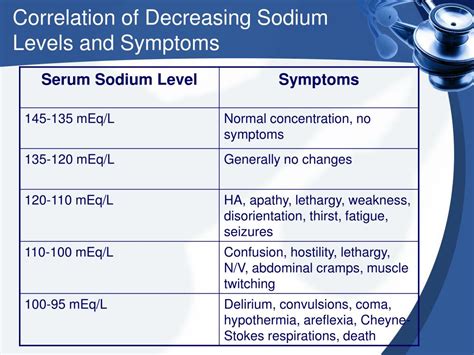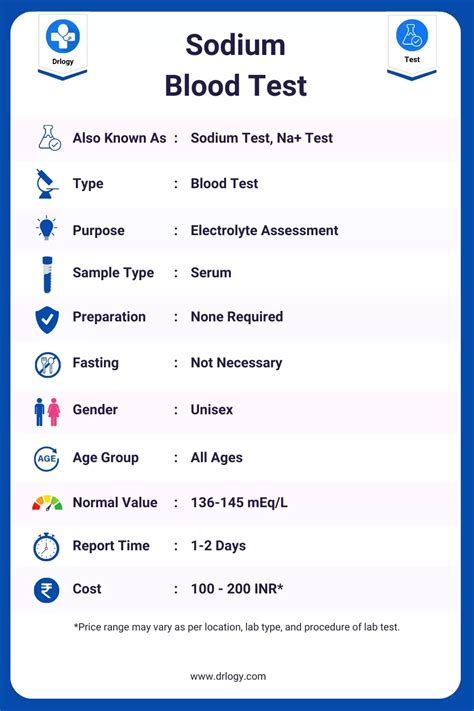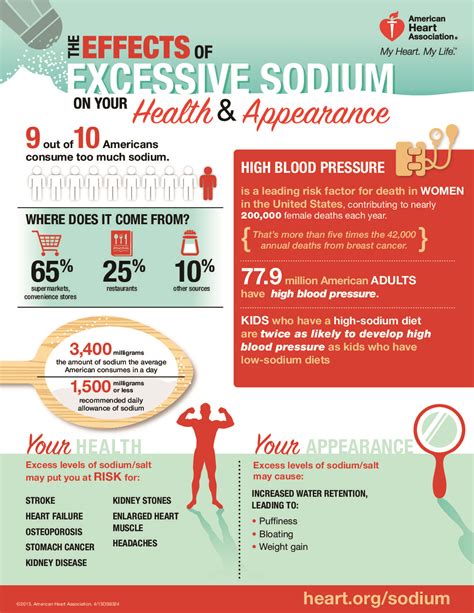Intro
High sodium blood levels pose serious health risks, including hypertension, heart disease, and stroke, emphasizing the importance of managing sodium intake to prevent hypernatremia and related cardiovascular complications.
High sodium blood levels, also known as hypernatremia, is a condition where the concentration of sodium in the blood exceeds 145 mmol/L. Sodium is an essential mineral that helps regulate the amount of water in the body and supports nerve and muscle function. However, excessive sodium levels can lead to a range of health problems. In this article, we will delve into the risks associated with high sodium blood levels, its causes, symptoms, and treatment options.
The importance of maintaining a healthy sodium balance cannot be overstated. Sodium helps regulate the amount of water in the body, which is crucial for maintaining proper blood pressure, nerve function, and muscle contractions. However, when sodium levels become too high, it can lead to a range of complications, including dehydration, seizures, and even death. It is essential to understand the risks associated with high sodium blood levels and take steps to prevent and manage this condition.
High sodium blood levels can have severe consequences on the body. When sodium levels become too high, it can cause the body to lose water, leading to dehydration. Dehydration can cause a range of symptoms, including headaches, fatigue, and dizziness. In severe cases, dehydration can lead to seizures, coma, and even death. Furthermore, high sodium levels can also lead to the formation of kidney stones, which can be extremely painful and may require surgical intervention. It is crucial to understand the causes and symptoms of high sodium blood levels to take prompt action and prevent long-term damage.
Causes of High Sodium Blood Levels

High sodium blood levels can be caused by a range of factors, including dehydration, certain medications, and underlying medical conditions. Dehydration is a common cause of high sodium blood levels, as it can cause the body to lose water, leading to an imbalance of electrolytes. Certain medications, such as diuretics, can also contribute to high sodium levels by increasing urine production and leading to dehydration. Underlying medical conditions, such as kidney disease, heart failure, and liver disease, can also cause high sodium blood levels.
Dehydration and High Sodium Blood Levels
Dehydration is a significant cause of high sodium blood levels. When the body loses water, it can lead to an imbalance of electrolytes, including sodium. Dehydration can be caused by a range of factors, including excessive sweating, vomiting, and diarrhea. It is essential to drink plenty of water and electrolyte-rich fluids to prevent dehydration and maintain a healthy sodium balance.Symptoms of High Sodium Blood Levels

The symptoms of high sodium blood levels can vary depending on the severity of the condition. Mild cases may not exhibit any symptoms, while severe cases can cause a range of complications, including seizures, coma, and even death. Common symptoms of high sodium blood levels include:
- Headaches
- Fatigue
- Dizziness
- Nausea and vomiting
- Seizures
- Coma
Diagnosing High Sodium Blood Levels
Diagnosing high sodium blood levels typically involves a physical examination, medical history, and laboratory tests. A healthcare provider may perform a physical examination to check for signs of dehydration, such as dry mouth and dark urine. A medical history may be taken to determine if the individual has any underlying medical conditions that may be contributing to the high sodium levels. Laboratory tests, such as a blood test, may be performed to measure the sodium levels in the blood.Treatment Options for High Sodium Blood Levels

Treatment for high sodium blood levels typically involves addressing the underlying cause of the condition. If dehydration is the cause, the individual may be given fluids to drink to help replenish lost electrolytes. If the condition is caused by an underlying medical condition, treatment may involve managing the underlying condition. In severe cases, hospitalization may be necessary to provide close monitoring and treatment.
Preventing High Sodium Blood Levels
Preventing high sodium blood levels involves maintaining a healthy sodium balance and addressing any underlying medical conditions. This can be achieved by:- Drinking plenty of water and electrolyte-rich fluids
- Avoiding excessive sodium intake
- Managing underlying medical conditions
- Avoiding medications that can contribute to high sodium levels
Complications of High Sodium Blood Levels

High sodium blood levels can lead to a range of complications, including dehydration, seizures, and even death. Dehydration can cause a range of symptoms, including headaches, fatigue, and dizziness. Seizures can occur when the brain is affected by the high sodium levels, and in severe cases, it can lead to coma and even death.
Managing Underlying Medical Conditions
Managing underlying medical conditions is crucial in preventing high sodium blood levels. This can be achieved by:- Working with a healthcare provider to manage the underlying condition
- Taking medications as prescribed
- Making lifestyle changes, such as following a healthy diet and exercising regularly
Conclusion and Next Steps

In conclusion, high sodium blood levels can have severe consequences on the body. It is essential to understand the causes, symptoms, and treatment options for this condition. By maintaining a healthy sodium balance, addressing underlying medical conditions, and taking steps to prevent dehydration, individuals can reduce their risk of developing high sodium blood levels. If you suspect that you or someone you know has high sodium blood levels, it is crucial to seek medical attention promptly.
We invite you to share your thoughts and experiences with high sodium blood levels in the comments below. Have you or someone you know been affected by this condition? What steps have you taken to manage and prevent it? Share your story and help raise awareness about the importance of maintaining a healthy sodium balance.
What are the causes of high sodium blood levels?
+High sodium blood levels can be caused by dehydration, certain medications, and underlying medical conditions, such as kidney disease, heart failure, and liver disease.
What are the symptoms of high sodium blood levels?
+The symptoms of high sodium blood levels can vary depending on the severity of the condition and may include headaches, fatigue, dizziness, nausea and vomiting, seizures, and coma.
How can high sodium blood levels be prevented?
+High sodium blood levels can be prevented by maintaining a healthy sodium balance, addressing underlying medical conditions, and taking steps to prevent dehydration, such as drinking plenty of water and electrolyte-rich fluids.
What are the complications of high sodium blood levels?
+High sodium blood levels can lead to a range of complications, including dehydration, seizures, and even death.
How is high sodium blood levels treated?
+Treatment for high sodium blood levels typically involves addressing the underlying cause of the condition, such as dehydration or underlying medical conditions, and may involve hospitalization in severe cases.
